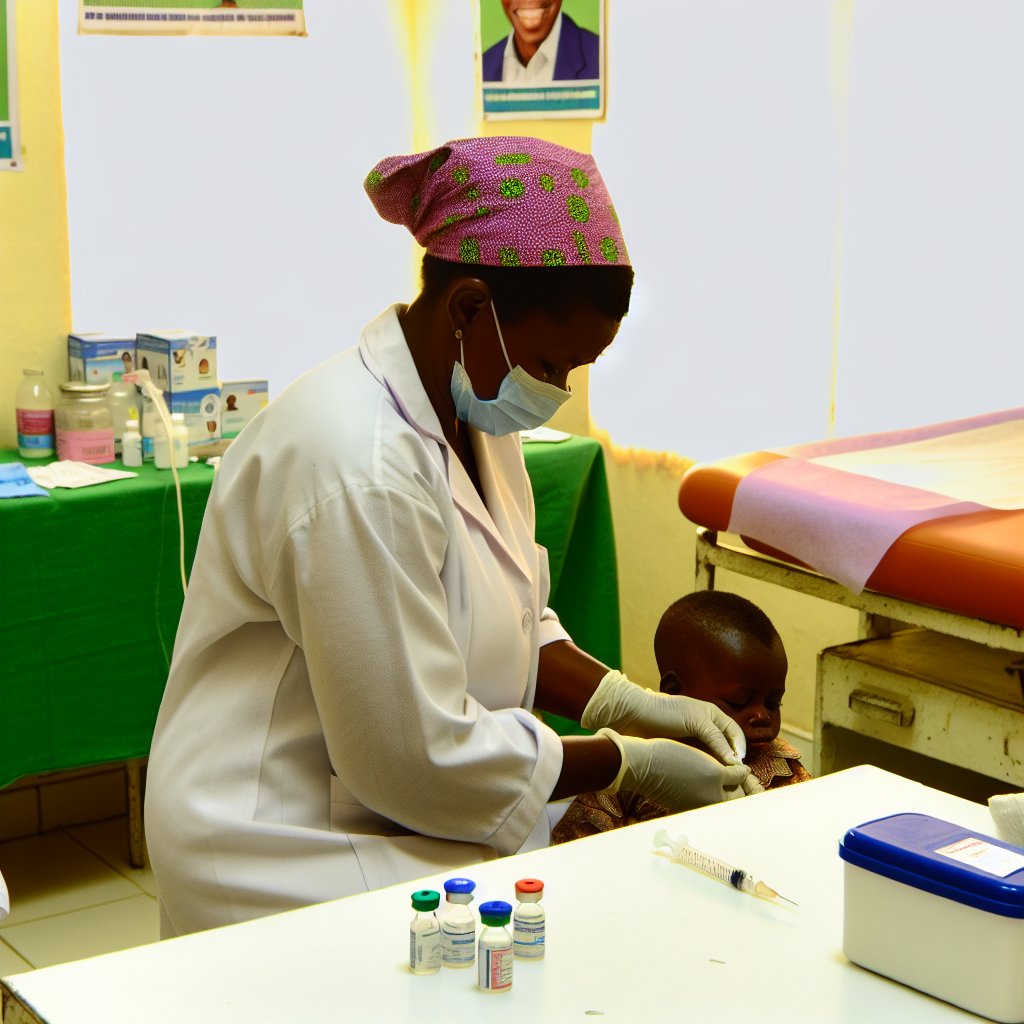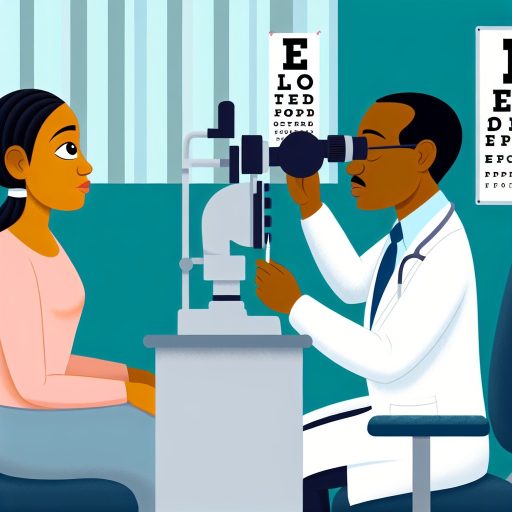Introduction:
The childhood immunization schedule in Nigeria is crucial for a child’s health.
It is important to follow the schedule to protect children from preventable diseases.
Key vaccines in Nigeria’s childhood immunization schedule include polio, measles, and yellow fever.
Overview of Childhood Immunization Schedule in Nigeria:
Childhood immunization is crucial for public health.
List of Vaccines Included:
- Bacillus Calmette-Guérin (BCG) vaccine
- Oral poliovirus vaccine (OPV)
- Diphtheria, tetanus, and pertussis (DTP) vaccine
- Hepatitis B vaccine
- Haemophilus influenzae type b (Hib) vaccine
- Pneumococcal conjugate vaccine (PCV)
- Rotavirus vaccine
- Measles vaccine
Recommended Timeline for Each Vaccine:
- BCG vaccine: At birth
- OPV and DTP vaccines: At 6, 10, and 14 weeks
- Hepatitis B vaccine: At birth, 6, and 14 weeks
- Hib and PCV vaccines: At 6, 10, and 14 weeks
- Rotavirus vaccine: At 6 and 10 weeks
- Measles vaccine: At 9 months
Importance of Following the Schedule:
- Protects children from serious diseases
- Prevents outbreaks in the community
- Ensures long-term immunity
- Reduces healthcare costs for families and government
- Contributes to the overall health and well-being of children
Types of Vaccines in Childhood Immunization Schedule:
– The different types of vaccines included in the schedule are:
- Polio Vaccine
- Measles Vaccine
- Hepatitis B Vaccine
– Each vaccine plays a crucial role in preventing serious illnesses:
Polio Vaccine:
The polio vaccine is essential for preventing the spread of poliovirus, which can cause paralysis.
By vaccinating children against polio, we can eradicate the disease and protect future generations from its devastating effects.
Measles Vaccine:
The measles vaccine is highly effective in preventing measles, a highly contagious viral infection.
By ensuring children receive the measles vaccine, we can reduce the risk of outbreaks and prevent severe complications such as pneumonia and encephalitis.
Hepatitis B Vaccine:
The hepatitis B vaccine is crucial for protecting against hepatitis B virus, which can lead to chronic liver infections and even liver cancer.
By vaccinating children against hepatitis B, we can significantly reduce the burden of liver-related diseases in the population.
Childhood immunization with these vaccines is a cost-effective and life-saving intervention.
This not only protects individual children but also contributes to the broader public health goals of disease prevention and control.
Discover More: Preventive Dentistry for Seniors in Nigeria
Challenges of Childhood Immunization in Nigeria
When it comes to childhood immunization in Nigeria, there are several challenges that hinder the effective implementation of the immunization schedule.
These challenges play a significant role in the low immunization rates among children in the country.
It is crucial to address these challenges to ensure that all children receive their vaccines on time and are protected from preventable diseases.
Lack of Awareness
One of the common challenges faced in implementing childhood immunization schedules in Nigeria is the lack of awareness among parents and caregivers.
Many parents are not informed about the importance of timely immunization and the benefits it provides to their children.
This lack of awareness leads to missed immunization opportunities and increases the risk of vaccine-preventable diseases.
Inadequate Infrastructure
Another significant challenge is the inadequate infrastructure in some parts of Nigeria, especially in remote and rural areas.
Lack of proper healthcare facilities, cold chain storage for vaccines, trained healthcare workers, and transportation to reach communities hinder the effective delivery of vaccines to children.
This infrastructure deficiency contributes to the delay or non-administration of vaccines, affecting immunization coverage rates.
Vaccine Hesitancy
Vaccine hesitancy is a growing concern in Nigeria and has become a barrier to achieving high immunization rates.
Some parents express doubts or fears about the safety and efficacy of vaccines, leading to hesitancy in vaccinating their children.
Misinformation, myths, and misconceptions about vaccines spread through social media and other channels fuel vaccine hesitancy, further complicating the immunization process.
Possible Solutions to Overcome Challenges
Improve Awareness and Education
Health authorities and organizations must invest in public health campaigns to raise awareness about the importance of immunization.
Creating targeted messages, using local languages, and engaging community leaders can help dispel myths and misconceptions about vaccines.
Education programs for parents and caregivers can empower them with accurate information to make informed decisions about immunizing their children.
Strengthen Healthcare Infrastructure
Investing in the healthcare infrastructure is crucial to improving immunization services in Nigeria.
Building and upgrading healthcare facilities, ensuring the availability of cold chain storage for vaccines, training and equipping healthcare workers, and implementing outreach programs to reach underserved communities are essential steps to overcome infrastructure challenges.
Collaborations with the private sector and non-governmental organizations can also support infrastructure development.
Address Vaccine Hesitancy
To tackle vaccine hesitancy, healthcare providers and public health officials need to engage in open and transparent communication with the public.
Addressing concerns, providing factual information about vaccines, listening to parents’ anxieties, and building trust in the immunization process are key strategies to combat vaccine hesitancy.
Encouraging healthcare professionals to have conversations with hesitant parents and addressing their concerns can improve vaccine acceptance rates.
See Related Content: Success Stories: Leading Ophthalmologists in Nigeria
Healthcare Providers in Childhood Immunization
Healthcare providers play a crucial role in ensuring that children receive timely and appropriate vaccinations.
Importance of the Role of Healthcare Providers
- Healthcare providers are responsible for administering vaccines to children according to the recommended schedule.
- They play a key role in educating parents about the importance of immunization in protecting their child’s health.
- Healthcare providers help to dispel myths and misinformation about vaccines, promoting trust in the vaccination process.
Training and Qualifications for Healthcare Providers
- Healthcare providers involved in immunization must undergo specific training on vaccine administration and storage.
- They should be licensed professionals, such as doctors, nurses, or pharmacists, with the necessary skills to administer vaccines safely.
- Continuous education and training are essential to ensure that healthcare providers are up-to-date on the latest vaccine recommendations.
Need for Healthcare Providers to Stay Informed
- Healthcare providers must stay informed about changes in vaccine recommendations and guidelines issued by health authorities.
- They should be aware of any new vaccines that are introduced and understand the benefits and risks associated with each one.
- Keeping abreast of the latest research on vaccines helps healthcare providers make informed decisions about immunization practices.
Healthcare providers play a critical role in childhood immunization by administering vaccines, educating parents, and staying informed about vaccine recommendations.
Their dedication and expertise are essential in ensuring that children are protected from vaccine-preventable diseases.
Transform Your Career with Expert Guidance
Get personalized mentorship consulting that’s tailored to your unique path. Our expert advice is actionable and exclusive.
Get StartedUncover the Details: Radiography and Radiology in Rural Nigeria
When it comes to childhood immunization in Nigeria, parental involvement is crucial for ensuring that children receive vaccines on time.
Parents play a significant role in protecting their children from preventable diseases by following the recommended immunization schedule.
Importance of Parental Involvement
- Parents play a crucial role in ensuring their children receive vaccines on time.
- Parental involvement is essential for the overall health and well-being of children.
- Children rely on their parents to protect them from vaccine-preventable diseases.
Here are some tips for parents on how to keep track of their child’s immunization schedule:
Tips for Parents
- Keep a record of your child’s vaccinations and upcoming immunization due dates.
- Set reminders on your phone or calendar to ensure you don’t miss any vaccine appointments.
- Consult with your healthcare provider to understand the importance of each vaccine and its timing.
- Ask for a copy of your child’s immunization record to track their vaccination history.
It is common for parents to have concerns and misconceptions about vaccines. Addressing these issues can help encourage parental support for childhood immunization.
Addressing Common Concerns
- Myth: Vaccines can cause autism. Fact: Scientific research has debunked this myth repeatedly.
- Concern: Vaccines contain harmful ingredients. Fact: Vaccines undergo rigorous testing for safety.
- Myth: Natural immunity is better than vaccines. Fact: Vaccines are crucial for preventing outbreaks and protecting the community.
- Concern: Too many vaccines overwhelm the immune system. Fact: The immune system can handle multiple vaccines at once.
By addressing common concerns and misconceptions, parents can make informed decisions about their child’s immunization.
It is essential for parents to work together with healthcare providers to protect their children and communities from vaccine-preventable diseases.
You Might Also Like: Insurance for Oral and Maxillofacial Surgery in Nigeria

Government Initiatives and Policies on Childhood Immunization
The government of Nigeria has implemented various initiatives to improve childhood immunization coverage in the country.
Routine immunization programs have been established to ensure that children receive essential vaccines at the right time.
A national immunization schedule outlines the vaccines that children should receive at different ages.
The government conducts awareness campaigns to educate parents and caregivers about the importance of childhood immunization.
In an effort to improve access to vaccines, the government provides free vaccination services at public health facilities.
Key Policies and Programs Aimed at Promoting Childhood Immunization
The National Primary Health Care Development Agency (NPHCDA) is responsible for coordinating immunization activities in Nigeria.
Nigeria has made significant progress in eradicating polio through various programs supported by the government.
The government has adopted the Reaching Every Ward strategy to ensure that vaccines reach every community in the country.
The Midwives Service Scheme aims to improve immunization coverage by deploying midwives to remote areas to provide healthcare services.
Evaluation of Government Initiatives and Suggestions for Improvement
Government initiatives have led to an increase in immunization coverage rates across the country.
Challenges such as vaccine shortages, inadequate healthcare infrastructure, and vaccine hesitancy still pose barriers to achieving optimal immunization coverage.
Areas for improvement include strengthening vaccine supply chains to prevent stockouts.
Enhancing community engagement is necessary to address vaccine hesitancy.
Improving healthcare infrastructure in rural and underserved areas should also be prioritized.
There is a need for improved monitoring and evaluation of immunization programs to track progress and identify areas for improvement.
Commitment to Childhood Immunization
The government of Nigeria has shown a commitment to promoting childhood immunization through various initiatives and policies.
While progress has been made, there is still room for improvement to ensure that all children receive essential vaccines and are protected from preventable diseases.
By addressing challenges and implementing targeted strategies, Nigeria can enhance immunization coverage and safeguard the health of its youngest citizens.
Advancements in Vaccine Technology and Delivery Methods
New technologies are constantly being developed to improve vaccine efficacy and safety.
Nanotechnology and mRNA vaccines are promising areas for future vaccine development.
Advances in adjuvant technology can enhance immune response to vaccines.
Needle-free and oral vaccine delivery methods are being explored to increase accessibility.
Ongoing Research and Development
Nigeria is actively involved in clinical trials for new vaccines and immunization strategies.
Collaboration with international organizations and research institutions is key to advancing immunization.
Research on vaccine hesitancy and ways to improve vaccine acceptance is ongoing.
New vaccine candidates for emerging infectious diseases are under investigation.
Future Trends and Challenges
Urbanization and population growth will increase the demand for immunization services.
Climate change may lead to the emergence of new infectious diseases that require vaccination.
Ensuring equitable access to vaccines and addressing vaccine hesitancy are ongoing challenges.
Integration of immunization services with other healthcare interventions is essential for sustainability.
The future of childhood immunization in Nigeria holds great promise with advancements in technology, ongoing research efforts, and a focus on addressing future trends and challenges.
Importance of Childhood Immunization in Nigeria
After discussing the childhood immunization schedule in Nigeria, it is clear that following the recommended vaccines is crucial for children’s health.
Missing or delaying vaccinations can leave children vulnerable to serious diseases.
It is essential for parents and caregivers to prioritize their child’s vaccinations to ensure they are protected from preventable illnesses.
Staying informed about immunization guidelines and schedules is key to maintaining a healthy community.
By adhering to the immunization schedule, parents can help eradicate deadly diseases and protect not only their children but also others in the community.
It is a collective responsibility to ensure that children receive timely vaccinations to prevent outbreaks and support public health efforts.
Additional Resources
The prevalence of hepatitis B virus infection in Nigerian children …
Breaking barriers, building bridges: the collaborative effort to reach …




